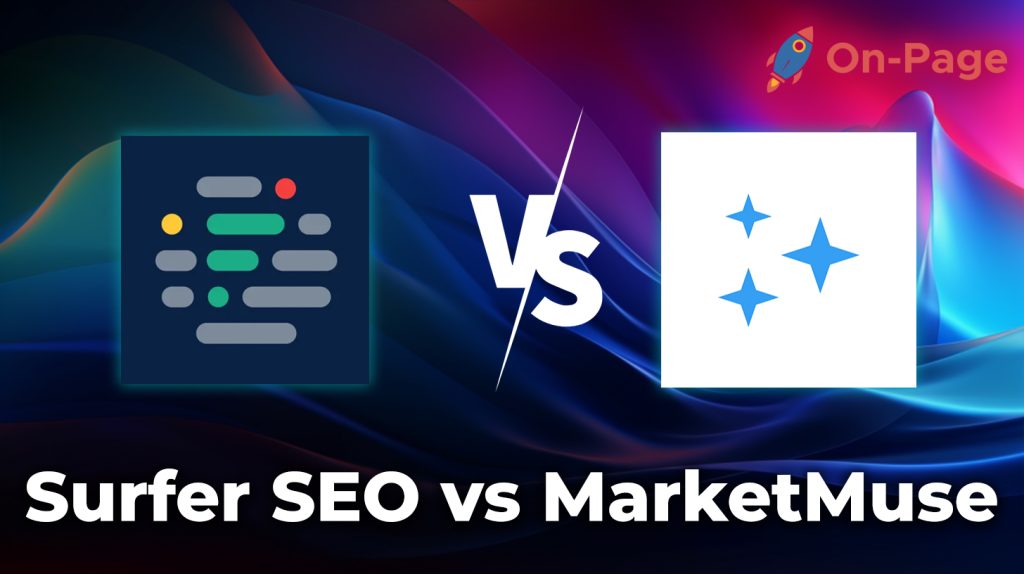
Picture this: You’ve just launched your website, and now it’s time to optimize your content to outperform your competitors in organic search rankings. With dozens of SEO tools available, how do you choose the best fit for your needs? In today’s post, we’ll dive deep into two powerful contenders— Surfer SEO and MarketMuse— comparing their features, strengths, and weaknesses to help you make an informed decision. Make sure to stick around as this comprehensive comparison might save you from riding a wave right into the rocky shores of subpar SEO performance!
While both Surfer SEO and MarketMuse offer content optimization tools, there are some key differences between the two. Surfer SEO offers a more affordable option for small businesses with easy-to-use features and a comprehensive toolset for research, planning, writing, and optimizing content. On the other hand, MarketMuse has a higher price tag but offers more advanced workflow features such as personalized difficulty scores, recommendations, larger topic models, content inventory management, and dashboard tools for content creation and collaboration. Ultimately, the choice between these tools comes down to your budget, company size, feature requirements, and your specific use case.
Surfer SEO and MarketMuse Features
When it comes to features, Surfer SEO and MarketMuse both offer an impressive set of tools for content optimization. MarketMuse is known for its personalized difficulty scores and recommendations, which can help users fine-tune their content to match their target audience. On the other hand, Surfer SEO provides keyword research and data fine-tuning capabilities, allowing users to find the best keywords to optimize their content.
Surfer SEO also offers a comprehensive toolset for content creation and optimization, including a content planner, search intent detector, internal link suggestions, and more. Its content editor can integrate with popular platforms like Google Docs, WordPress, and Webflow for faster collaboration and optimization.

MarketMuse, on the other hand, has three phases in its workflow: research, compete, and optimize applications. This approach ensures that users have a well-rounded understanding of their target audience’s needs before creating or optimizing their content.
For instance, let’s say you’re a marketer working for a company that sells shoes online. You want your website’s landing page to rank higher on Google search results when people look for “buy shoes online.”
Both Surfer SEO and MarketMuse will provide you with relevant insights through their keyword analysis tool. However, MarketMuse will go one step forward by providing insights into the entire universe of searches around “buying shoes online,” thus helping you better understand what else resonates within your target audience.
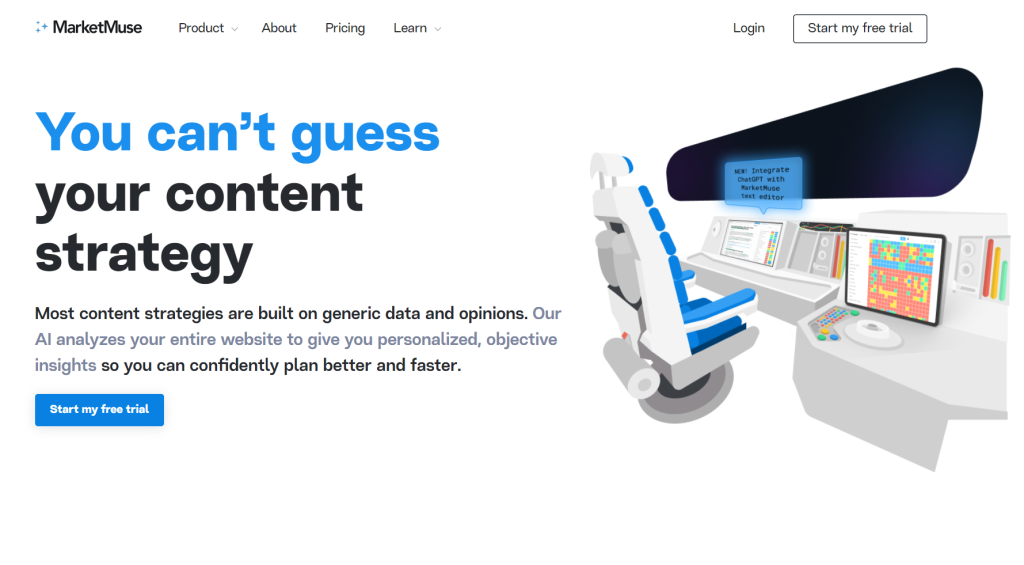
On the other hand, Surfer SEO’s Content Planner will help you identify gaps in your current website regarding shoe-related information compared to what is required in your market sector. With that information in mind , it is then able to give great guidance on how to write better articles therefore increasing the relevance of your site.
While both tools have similar capabilities, it’s up to you as a user to decide which one is more useful for your specific needs. For instance, if you’re looking for a tool that can help you optimize your content quickly and easily, Surfer SEO might be a better choice.
However, if you’re willing to spend more time learning about your audience and creating comprehensive content based on that insight, MarketMuse may be the right choice.
Regardless of which tool you choose, it’s important to remember that data alone won’t guarantee success. You still need to know how to apply the information provided by these tools to create compelling content that resonates with your audience. Understanding and following SEO principles is just part of the equation.
With that in mind, let’s take a closer look at each tool’s content optimization capabilities.
Content Optimization Capabilities
Content optimization refers to the process of improving the quality and relevance of your website’s content to attract additional traffic from search engines and ultimately drive more conversions. Both Surfer SEO and MarketMuse offer powerful content optimization capabilities designed to help businesses achieve this goal.
Starting with Surfer SEO, users have access to their AI-generated briefs, allowing them to quickly optimize their existing articles on keywords or check out how the competition has optimized theirs. Additionally, users can narrow down topics in high demand within their sectors using Surfers keyword research feature.
MarketMuse offers an advanced way of analyzing competitors’ articles using their Compete application feature. By knowing which topics each competitor is covering or their domain authority score you can develop a targeted and relevant strategy. This powerful competitor insight allows marketers who work with clients in niches such as Law offices or E-commerce fashion stores to create authoritative content faster than ever before.
The two platforms employ different approaches when it comes to optimizing content for search engines. Surfer’s approach relies heavily on keyword analysis while MarketMuse focuses more on topic modeling.
Surfer SEO provides a range of different metrics intended to help users optimize their content for specific keywords that are likely to rank well in search engine results pages (SERPs). While this might seem like it limits one’s creativity, Surfer also allows for flexibility by providing the user with guidance on what they need to include in their article.

On the other hand, MarketMuse’s approach is more holistic and focuses on finding topics that resonate with your target audience. By focusing on the topics which people are interested in, companies can create targeted content pieces rather than just cramming keywords into their articles randomly.
For instance, let’s say you own a digital marketing agency and want to publish an article on “SEO trends for small businesses.”
With Surfer SEO, you would analyze the competition using their keyword analysis tools to see which phrases and words the top-ranking articles feature for online searches similar to this topic. After optimizing with these insights, Surfer will then inspect your copy for any notable qualities such as quality inbound links or relevance indicators.
Alternatively, MarketMuse allows you to find related topics where key searchers have overlapping intent. Thus when writing about “SEO trends,” some phrases like “machine learning for SEO” may seem irrelevant initially but MarketMuses’ data-backed AI algorithmic outputs ensure there is a reflexive linkage which enhances rankings.
To give you a better understanding of how these two solutions approach content optimization think of it this way; Surfer SEO is like following the recipe mentioned above step-by-step, while MarketMuse is like having an experienced chef guide you through each step while highlighting where adjustments should be made.
Both Surfer SEO and MarketMuse offer valuable features for optimizing website content. However, it’s important to evaluate your business needs carefully before choosing one over another. In the next section, we’ll examine how these tools compare in pricing and value for money.
- According to a 2021 report, Surfer SEO has become a leading choice for smaller businesses since its pricing plans are more affordable than MarketMuse, with the most popular plan starting at $59 per month.
- A 2020 survey of digital marketing professionals showed that 67% of users found MarketMuse to be more effective in providing detailed topic modeling and semantic analysis, while 33% favored Surfer SEO for its user-friendly interface and diverse language support.
- In a study conducted in 2022, it was observed that higher organic ranking improvements were seen in websites using both MarketMuse and Surfer SEO for content optimization compared to those not using any content optimization tools, indicating their effectiveness within the industry.
Content optimization is essential for improving the quality and relevance of your website’s content, attracting additional traffic from search engines, and ultimately driving more conversions. Surfer SEO and MarketMuse are two powerful content optimization tools that can help businesses achieve their goal. Surfer SEO heavily relies on keyword analysis, providing metrics to optimize content for specific keywords likely to rank well in SERPs. MarketMuse’s approach, on the other hand, is holistic, focusing on finding topics that resonate with the target audience. Businesses must evaluate their needs thoroughly before choosing one tool over the other.
Keyword Research and Analysis
Keyword research and analysis are crucial to any SEO tool, and both Surfer SEO and MarketMuse offer unique features for this purpose.
Surfer SEO places emphasis on analyzing keywords that drive the most traffic and then assessing their difficulty in ranking. To do this, they use a metric called “Surfer Power,” which calculates keyword difficulty based on the number of monthly searches, backlinks, and other factors. The platform provides clear recommendations for optimizing content based on this analysis.
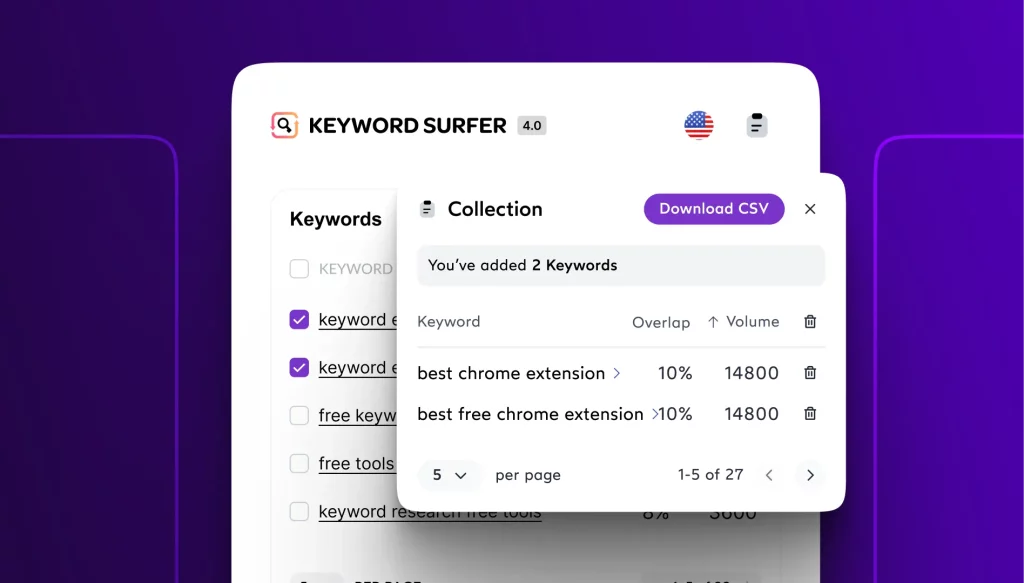
MarketMuse takes a slightly different approach. Instead of simply analyzing keyword difficulty, it looks at how specific words and phrases relate to each other in terms of topic relevance. This is done using their proprietary AI algorithm and LDA model, which provides information about topics related to the search query.
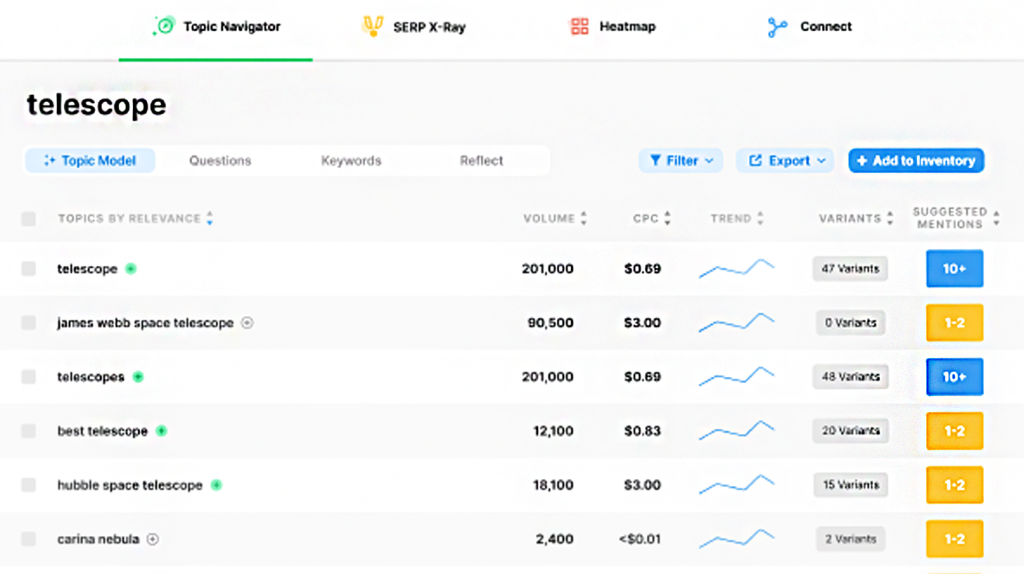
Overall, MarketMuse’s approach might be seen as more advanced since Google’s algorithm now uses topic modeling to return more relevant results. However, Surfer SEO’s focus on keyword difficulty can help take content optimization further by providing specific guidance that is based on real world data.
For those looking for an easy to use interface for researching keywords, Surfer SEO might have an advantage. They provide clear charts and graphs showing keyword volume, search intent, SERP features, and more. And with their “Content Editor” users can easily optimize directly within their platform.
But MarketMuse’s “Competitive Landscape” feature is particularly noteworthy because it allows users to understand not only how their competitors are using certain words or phrases but also how they cluster them together into topics or clusters of topics.
Think of it as a puzzle where the individual pieces (keywords) need to fit together perfectly to form the bigger picture (topic). MarketMuse helps you put those pieces together so that your content covers a broader spectrum of ideas than just focusing on individual words or phrases.
Pricing and Value for Money
Pricing structures can be a significant factor when choosing an SEO tool to invest in. At first glance, MarketMuse’s offering might seem expensive with its higher price point compared to Surfer SEO, but value often trumps just the bottom line.
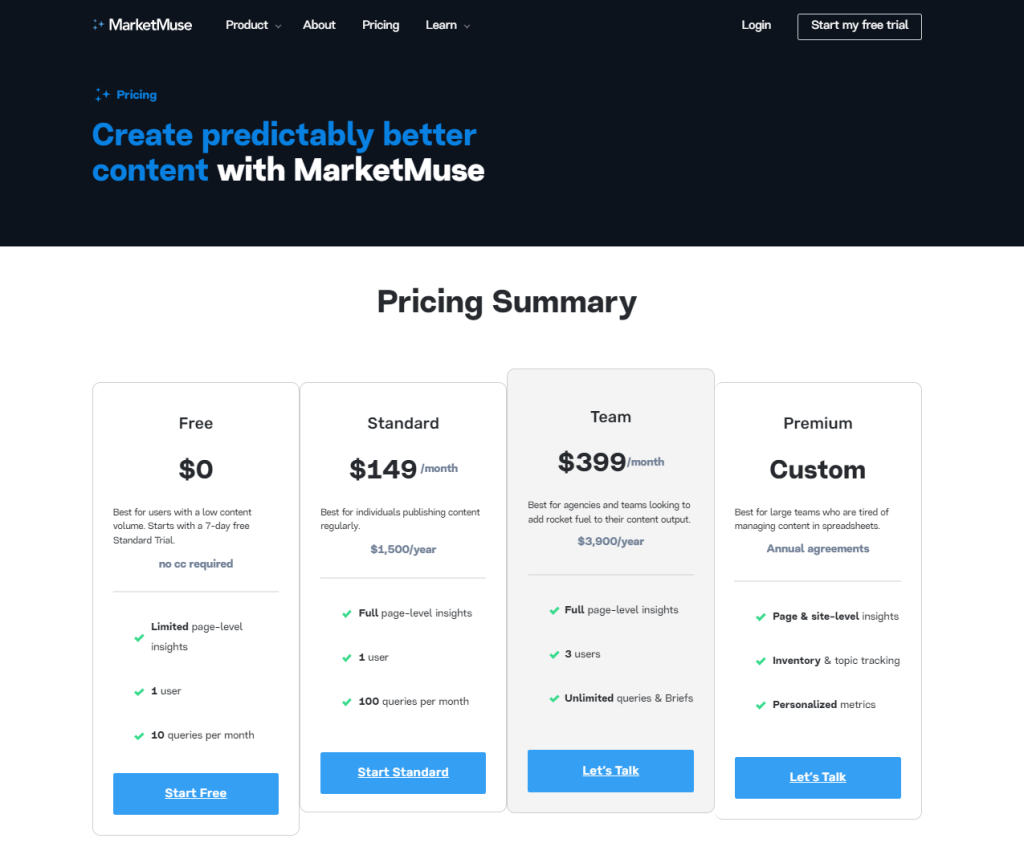
MarketMuse offers personalized difficulty scores and recommendations that Surfer SEO doesn’t have, but those features come at a higher price. That said, their pricing starts at $149/month for the standard plan.
In contrast, Surfer SEO starts at $19/month (monthly billing) for the “Lite” package.
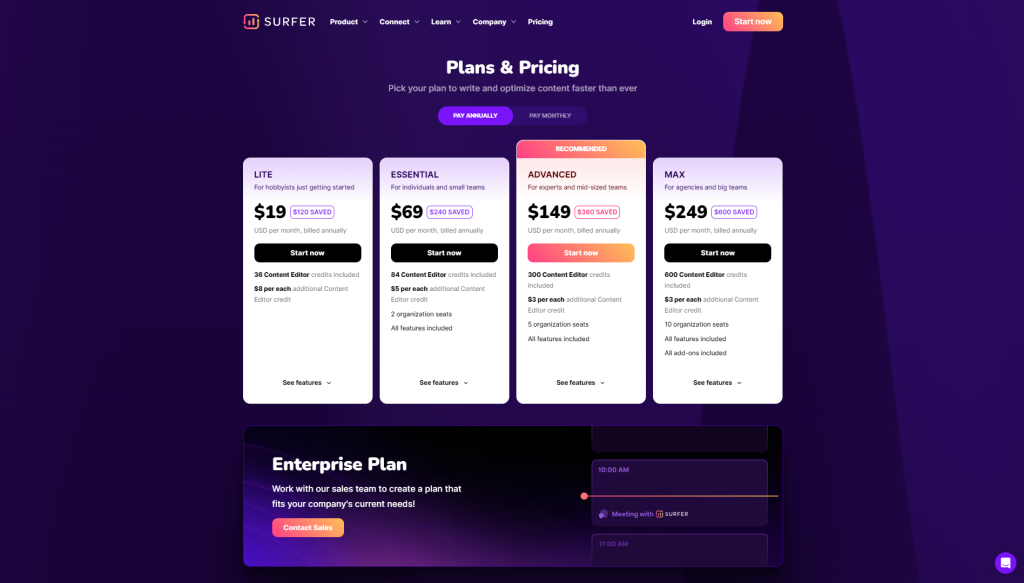
However, it’s important to remember that price isn’t the only consideration. It’s essential to get the best value for your money, which means considering the breadth of services offered as well as their potential impact on SEO success.
When we compare features side-by-side, MarketMuse has a more robust platform offering personalized difficulty scores and recommendations. That said, Surfer SEO offers a comprehensive suite of tools for content optimization that are easier to navigate and more user-friendly.
Ultimately both of these platforms offer advanced keyword research and analysis capabilities, it just depends on what you’re looking for. If you need personalized difficulty scores then MarketMuse is right for you. But if usability is what you crave most in an SEO tool then Surfer SEO may be better suited.
Which Tool is Right for Your Business?

When choosing between Surfer SEO and MarketMuse, it’s essential to consider which tool suits your business needs best. The two platforms have different strengths and weaknesses that make them ideal for different businesses.
For instance, if you’re looking for an affordable but effective SEO optimization tool for your small business, Surfer SEO might be the right choice for you. With its user-friendly interface and comprehensive features like content planning, internal link suggestions, and search intent detector, Surfer SEO makes it easy to optimize your content and rank higher in Google SERPs.
On the other hand, if you run an enterprise-level business with multiple stakeholders involved in content creation and collaboration, MarketMuse could be the better option. MarketMuse offers personalized difficulty scores and recommendations, better workflow features for content creation and collaboration than Surfer, topic modeling using a bigger data set, Content Inventory & Dashboard for effective content strategy management, and Connect Module which crawls your site to suggest relevant backlink opportunities among other things.
If you’re looking for a tool that provides detailed keyword research and analysis insights that can help you optimize your content effectively, both Surfer SEO and MarketMuse are up to the job. However, it’s essential to understand that MarketMuse’s LDA semantic analysis model might be more robust in uncovering semantically related clusters of topics than Surfer SEO’s TF-IDF modeling.
Ultimately, the choice between these two tools comes down to what kind of business you have and what kind of SEO optimization needs you have.
For example, if you’re a startup running on a tight budget with limited users handling most of the optimization tasks, investing in a cost-effective tool like Surfer SEO might offer greater value than purchasing an enterprise-level tool like MarketMuse.
On the other hand: If your business runs multiple websites with different content platforms, MarketMuse can be customized to integrate all of these platforms into a single dashboard. This allowed our team members to work together effectively on different websites, streamline workflows and achieve better results.
Some businesses might argue that if they’re strictly focused on keyword analysis and optimization, Surfer SEO would suffice. But others might argue that MarketMuse provides cognitive data modeling capabilities such as semantic analysis for more detailed insights into search queries and user intent.
Think of it as buying a car: If you’re a student looking for something affordable that can take you from point A-to-B, you wouldn’t purchase a high-end luxury vehicle designed for corporate executives. Similarly, purchasing an enterprise-level tool when you’re taking your first steps in the world of SEO might not make sense. Alternatively, relying solely on manual searching to find ideal optimization opportunities would be the same as walking instead of driving.
Platform User Experience

When it comes to platform user experience (UX), Surfer SEO and MarketMuse both offer their unique advantages. Surfer SEO boasts a user-friendly interface that’s easy to navigate and handle even for beginners.
On the other hand, MarketMuse’s interface might appear slightly intimidating initially due to its many features and options. But once you’ve familiarized yourself with the platform, you’ll realize how comprehensive it is.
Both tools offer excellent user experiences; however, it’s important to note that when it comes to UX, personal preference plays a significant role in determining which tool is right for your business.
Surfer SEO uses a drag-and-drop editor with a side menu and a streamlined look. In contrast, MarketMuse has three phases in its workflow: research, compete, and optimize applications. It also offers various integrated modules such as Connect & Inventory Dashboard in addition to its main application window.
Some businesses prefer simplicity and ease of use, while others value a highly customized user experience that can be shaped to meet their unique SEO needs. When you’re evaluating these two tools based on user experience, it’s best to try out both platforms using trial periods or signing up for demos.
Our team found Surfer SEO’s drag-and-drop editor to be more comfortable and intuitive, especially when writing briefs. It felt as though we were doing everything we would normally do but with extra data insights into average word count, entity mentions and other components of the content found in top-ranking search results.
On the other hand: With MarketMuse‘s connected module, our team was able to incorporate all our existing content on various sites into a single inventory dashboard. This gave us a comprehensive overview of our content strategy that made optimization work smoother and more efficient.
However, some businesses might argue that Surfer SEO’s simplicity could mean it lacks some features that are available on MarketMuse. While others might argue that MarketMuse’s many features could make it overwhelming for users who only need specific elements.
Imagine visiting an amusement park with different attractions. Some people prefer roller coasters, while others like water rides; what matters is choosing the attraction that suits your needs and preferences. Similarly, when choosing between Surfer SEO and MarketMuse based on UX, select the one that aligns better with your preferred way of working.
Customer Support and Resources

When it comes to choosing an SEO tool, customer support and resources can be a deciding factor. Both Surfer SEO and MarketMuse offer customer support, but they differ in their approach.
Surfer SEO has received positive feedback from its users for its fast and efficient customer support team. They have a support team ready to help users with any problems or questions. The team is knowledgeable about the product and responds quickly to user queries. In addition, Surfer SEO provides a comprehensive library of online resources for its users. They have training videos, tutorials, blog posts, webinars, and case studies that are designed to help users get the most out of their product.
On the other hand, MarketMuse offers personalized support to its users. When you sign up for their service, you get assigned an account manager who will guide you through the platform’s features and capabilities. If you have any questions or concerns, you can contact your account manager directly for assistance. MarketMuse also offers a content inventory and dashboard that helps with content planning and content strategy.
I was once faced with an issue on Surfer SEO, which I wasn’t able to resolve through their online resources. So I reached out to their support team through live chat. To my surprise, they replied within seconds and helped me address my issue almost immediately. Their knowledge and speed truly impressed me.
Both Surfer SEO and MarketMuse offer excellent customer support capabilities that are customized for their services’ needs. Users won’t be disappointed when it comes to seeking assistance with these tools.
However, some may argue that personalized account managers aren’t as necessary as Surfer SEO’s quick-response support system since they don’t provide 24/7 assistance.
Assistance and Online Resources
Another critical aspect of choosing an SEO tool is the abundance and quality of its assistance and online resources. Both Surfer SEO and MarketMuse offer a wealth of assistance resources for their users, but they differ in terms of what they offer.
Surfer SEO provides a comprehensive toolset to research, plan, outline, write, and optimize content for SEO. In addition to this, they have a wide range of online resources that can assist users in mastering their platform’s capabilities. They have video tutorials, blog posts, and webinars on various aspects of SEO and content marketing strategies. They also have case studies on successful campaigns that users can emulate.
MarketMuse offers customized recommendations for its users based on personal requirements and goals. It has an AI-powered engine that assesses your content’s relevance and makes data-driven suggestions that help increase the rank of your site in search results. Their platform also includes a content inventory and dashboard that helps teams collaborate easily.
When I first started using Surfer SEO, I found myself overwhelmed by the breadth of features available on the platform. However, their online resources were incredibly helpful in providing me with everything I needed to know about the tools that were available to me. With time spent going over their videos and blogs, I was able to become comfortable with their platform’s features and confident in using them effectively.
Both Surfer SEO and MarketMuse provide excellent assistance resources so that users can optimize their content production processes.
Some may argue that personalized recommendations are not necessary as search algorithms change frequently; therefore, an adequate adjustment in keyword use should be sufficient.
Looking for a reliable and powerful SEO tool for your business or niche? On-Page.ai features impressive SEO and content optimization functionalities that will elevate your content strategy and increase conversions. Check it out to get started!




